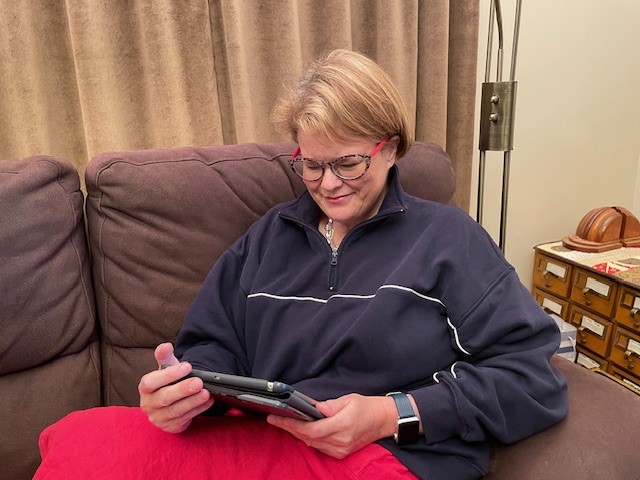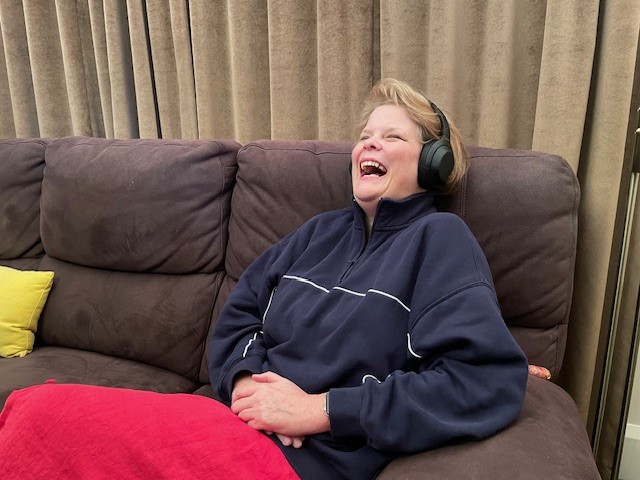Hello, my name is Katie, and I am one of the librarians at Christchurch City Libraries. I am also dyslexic, and in celebration of neurodiversity week (18-24 March) I would like to tell you about how using the eBooks and eAudiobooks in our collection has ameliorated one of the most debilitating symptoms I experience. That symptom is that the words move on the page, well more accurately for me the words sort of blink on and off. Viewing this page will give you an idea of what that is like, if you've never experienced it. Rather challenging, isn't it?
Another symptom I have is that I can find it very difficult to scan from the end of one sentence at the right-hand edge of the page to the beginning of the next sentence at the left-hand edge of the page. This is something that I am sure is not limited to people with dyslexia (as anyone who has read a tightly printed page when they are tired will understand!) This has meant that over the years, as much as I love reading and love books (I am a librarian, so need I say more?),
I read books very slowly, it is effortful, and I have a very particular environment in which I like to read (low dim daylight, amongst other things). It has also meant that I thought I did not like many books, Dickens for example, although that was based on just looking at how densely packed with text the pages of some of his books were, so hardly evidence-based.
However, now and after several years of experimentation and reflection, this is no longer the case. How come? I now read purely in the e-environment.
I read fiction as eBooks and listen to my favourite non-fiction books as eAudiobooks. I just don't read physical books any more and as a result I now read just as fast and as easily as I think most non-dyslexic people do. And Dickens, is now okay! This is based on my having read a number of his books now, including Bleak House (and I am so sorry Scorpio books, as I would love to buy so many books from you but I just don't read in that format anymore!)
So the next question is... why?
I have found that by adjusting the layout of the words reading is less effortful, takes less planning and overall, it is just easier. I customise my reading experience with the following;
- increased line spacing
- having left aligned only (not justified)
- using a sans serif font
- setting the background to cream or sepia
The British Dyslexia Association Style Guide provides the definitive guide to settings that for me, minimises the rate and number of words blinking on and off and improves my scanning of sentences to the point that I now read so, so much more quickly. I used to be in awe of people who said that they could read a gripping book in a night or in a few hours. Well, now I can too. This just fills me with so much joy!
However, for some books changing the page layout was not enough to relieve my symptoms, and this is where eAudiobooks have also revolutionised (and I am truly not over egging the pie here!) how I read.
I love non-fiction, particularly anything on the history of medicine. My best book of book of the 2000's so far is Unnatural Causes: The life and many deaths of Britian's top forensic pathologist by Dr Richard Shepherd (it's remarkably ungory considering the topic, absolutely gripping and heartbreaking all at the same time - I cannot recommend it enough.) It is 494 pages long or 12 hours long to listen to. Similarly my favourite book of 2024 so far is Duel without end: Mankind's battle with microbes by Stig S. Frøland (translated from the Norwegian by John Irons), and it is 21 hours long (listening), or... 640 pages of small tightly, justified text. Oof.
Even changing the visual layout of these books to my preferred taste both books would be extremely long, intense, and dense reads. I found that even though I was utterly fascinated by the topic, really wanted to read them, and the writing was excellent, I was put off by these books in their printed formats - the denseness of the information and the highly technical content exacerbated my symptoms. However these issues were removed by listening instead.
So, I now find that I listen to non-fiction books (my absolute favourite books) and read fiction in eBook format, and the symptoms of my dyslexia no longer impact my reading. The symptoms will never go, but they no longer impact my love of reading, and that is amazing and enough for me.
Listen: Katie talks about dyslexia
Librarian Katie talks to Amy about dyslexia for the Plains FM radio show So Many Stories.
[MP3, 17 minutes]
Find out more
- Dyslexia and eBooks settings - a guide to changing settings in our eBook platforms; Libby, and Wheelers.
- Dyslexia resources - Find Dyslexia-friendly books and information about Dyslexia.
- Neurodiversity - Find resources about neurodiversity and information about Neurodiversity Celebration Week (18 to 24 March 2024).





Add a comment to: Confessions of a dyslexic librarian: Rediscovering the joy of reading through accessible formats